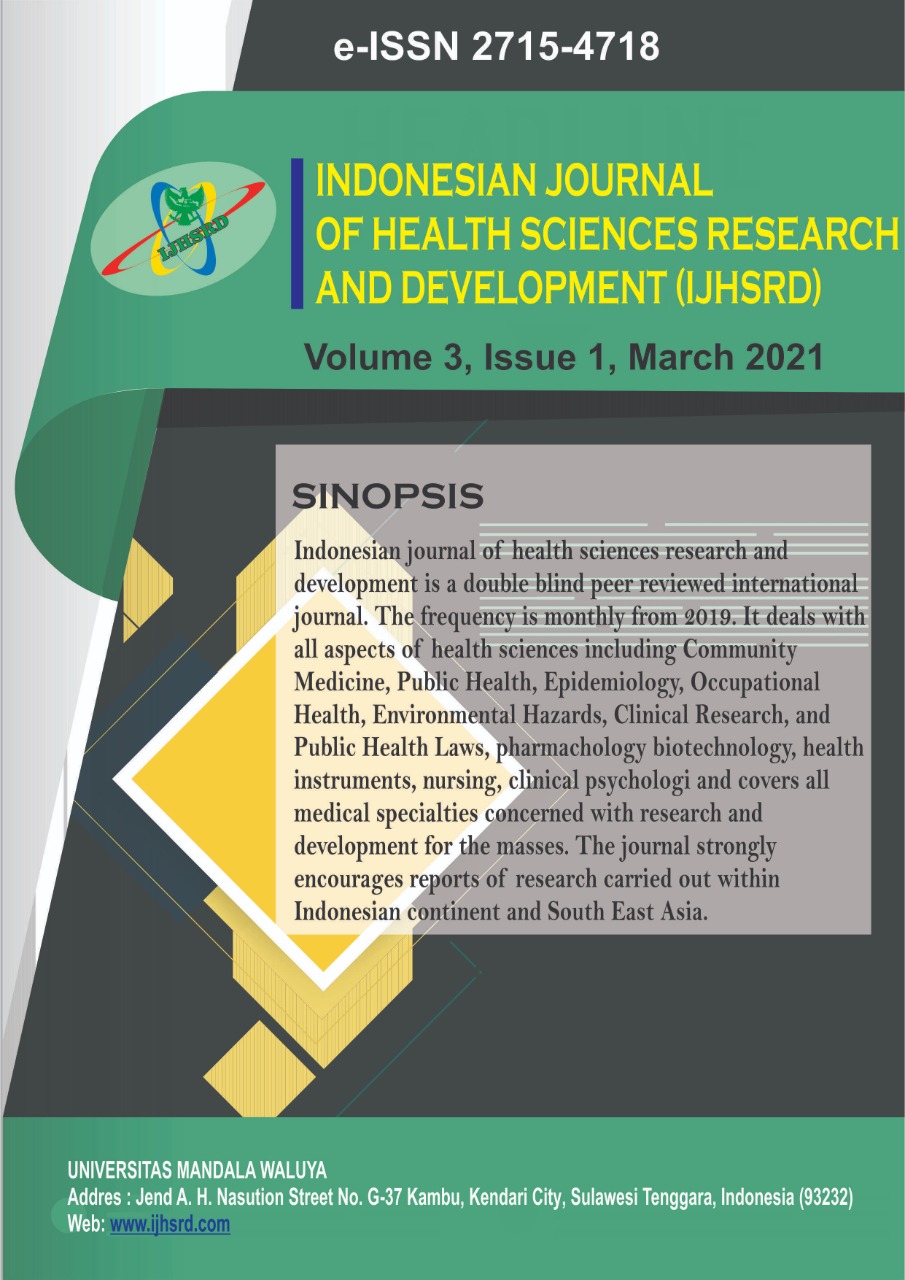Main Article Content
Abstract
Background.Stunting during the covid period requires policies of handling and prevention in accordance with law and human rights. Therefore, this study aims to determine the prevention strategies and human rights law related stunting to develop the health policy.
Method.A qualitative method through in-depth interviews was conducted on 6 informants from the city health office and health centre for strategy and literature study related to human rights and stunting policy law.
Results. The results show that there are several strategies that can be prioritized to overcome stunting in the Covid era, such as promotion and support of breastfeeding, Campaign for balanced nutrition and Clean and Healthy Living Behavior (PHBS), Education and counseling using the media, including Short Letter (SMS), or WhatsApp group, Priority services for children under five, through health services and home visits, provision of additional food for malnourished toddlers and pregnant women with chronic energy deficiency, and provision of nutritional supplementation.
Conclusion. It is necessary to modify the policy to improve the strategies at the regional level so that stunting can be solved in the pandemic and providing child protection people with stunting an obligation and the joint responsibility of the state, community, family and parents covering juridical protection, economic, social and cultural. Therefore, in fulfilling basic rights child, then the responsibility is carried out holistically by collaborating with the stakeholder.
Keywords
Article Details

This work is licensed under a Creative Commons Attribution-ShareAlike 4.0 International License.
References
- Al-Atok, A. Rashid. “Indonesian rule of law” (2016): 1–18. http://lab.pancasila.um.ac. id / wp-content / uploads / 2016/05 / The State Law of Indonesia By A-Rosyid-Al-Atok. Pdf
- Asshidiqie, Jimly. Caring for and Fulfilling the Guarantee of Citizens' Constitutional Rights. Jakarta, 2010.
- Azizah, KhadijahNur (2018). "Ministry of Health Launches Riskesdas 2018, Stunting Rate Declines!" Detik Health, November 2018. https: // health. detik.com/berita-detikhealth/d-4284274/ kemenkes-launch-riskesdas-2018-stunting-numbers-down.
- Izwardi, Doddy (2019). "Policies and Strategies for Poverty Reduction in Indonesia." DYNAMICS Rural and Area 2, no. 2: 41–52.
- Ministry of Health of the Republic of Indonesia (2018). "Stunting Reduction is the Government's Focus." Ministry of Health RI. Jakarta. http: // www. depkes.go.id/article/view/18050800004/ reduction-stunting-so-focus-government. html.
- ——— (2018). "Pusdatin: Situation of Short Toddler (Stunting) in Indonesia." Indonesian Ministry of Health 1: 2.
- Kurnia, TitonSlamet (2007) ,. Right to Optimal Health Degrees as Human Rights in Indonesia. Bandung: PT.Alumni.
- Mahmud Marzuki, Peter (2016). Legal Research. Revision. Jakarta: KencanaPranada Media Group.
- Mayasari, Diana, Reni Indriyani (2018). "Stunting, Risk Factors and Prevention of Stunting, Risk Factors and Prevention" 5: 540–545. Ikkom Division, Faculty of Medicine, University of Lampung, PoltekkesKemenkesTanjungkarang, and Bandar Lampung.
- Mugianti, Sri; Mulyadi, Arif; Khoirul, Agus; Lukluin, Zian, 2018. "Factors Causing Stunting Children Age 25-60 Months in Sukorejo District, Blitar City 1." Ners, Journal of Midwifery, Volume 5: 268–278. El Muhtsj, Majda. Dimensions of Human Rights (Describing Economic, Social and Cultural Rights). Jakarta: PT. RajawaliPers, 2008.
- Mustafa (2015). Stunting Problems and Interventions to Prevent Stunting (A Literature Review) ”2, no. 5.
- Neta, Yulia, 2013. Community Participation in Upholding of Human Rights in Democratic Countries. Monograph.
- Presidential Regulation Number 42 of 2013 which regulates the Implementation of the National Movement for the Acceleration of Nutrition Improvement.
- Regulation of the Minister of Health Number 39 of 2016 concerning Guidelines for Implementing a Healthy Indonesia Program with a Family Approach
- Pritasari, Kirana, 2019. "Efforts to Accelerate Stunting Reduction: 2018 Implementation Evaluation & 2019 Action Plan." Bogor: Indonesian Ministry of Health.
- Republika. WHO: 7.8 Million Toddlers in Indonesia are Stunting. Jakarta, 2018. https: // m. republika.co.id/amp/p30s85396 S,
- Almatseir, 2011. Basic Principles of Nutrition. Jakarta: PT. GramediaPustakaUtama.
- Satriawan, ELan (2018). National Strategy for the Acceleration of Stunting Prevention 2018-2024. Jakarta: National Team for the Acceleration of Poverty Reduction (TNP2K).
- Sugiyanto, S., Sumarlan, S., & Hadi, A. J. (2020). Analysis of Balanced Nutrition Program Implementation Against Stunting in Toddlers. Unnes Journal of Public Health, 9(2), 148-159. https://doi.org/10.15294/ujph.v0i0.34141
- Law of the Republic of Indonesia Number 39 of 1999 concerning Human Rights (State Gazette of the Republic of Indonesia of 1999 Number 165, Supplement to the State Gazette of the Republic of Indonesia Number 3886).
- Law of the Republic of Indonesia Number 36 of 2009 concerning Health (State Gazette of the Republic of Indonesia of 2009 Number 144, Supplement to the State Gazette of the Republic of Indonesia Number 5063).
- Law of the Republic of Indonesia Number 23 of 2002 concerning Child Protection (State Gazette of the Republic of Indonesia of 2002 Number 109, Supplement to the State Gazette of the Republic of Indonesia Number 4235).
- Law of the Republic of Indonesia Number 18 of 2012 concerning Food (State Gazette of the Republic of Indonesia of 2012 Number 227, Supplement to State Gazette of the Republic of Indonesia Number 5360).
